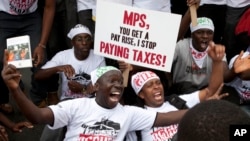NAIROBI —
Kenyan civil society groups have staged their second protest in less than a month against the decision by legislators to increase their own salaries. The protesters insist that what the members of parliament are paid is enough.
Demonstrators at the Kenyan parliament Tuesday poured animal blood on the street and tossed fake printed money at the gate, symbolizing the greed of the Kenyan lawmakers.
Musician Eric Wainaina, who was among more than 100 protesters, said there are other workers who deserve a pay rise more than legislators.
“We are here to campaign against the higher salaries MPs want to give themselves because the economy of Kenya cannot afford it and there are so many people who need to be aligned -- the doctors and the nurses and MPs are putting themselves ahead,” he said.
This is the third time that lobby groups held demonstrations against the lawmakers. Last month, they paraded pigs outside parliament as part of their protests.
Gaberiel Mayeye, 58, believes demonstrations will make a difference and will stop the lawmakers from abusing their power even further.
“How do we know that if we leave this to continue one day they will wake up and say that they will not leave this parliament forever? So we are just trying to prevent it before it comes worse,” said Mayeye.
Another protester, Caroline Akoth, said the salary dispute shows parliament considers itself above everybody, including the new president.
“This thing has started off badly since the new president came in, there is insecurity we are even surprised and members of parliament are not even listening to the president. It’s like they disrespect him too,” she said.
Newly-elected President Uhuru Kenyatta, in his first address to the parliament in April, expressed concern the cost of public wages is too high, and stated his desire to bring it down.
On March 4, the salary and remuneration commission revised lawmakers’ salaries down from $10,240 to $6,400 per month.
But the local media is reporting some MPs received $10,000 for the month of May, prompting the commission to warn whoever gets paid more than $6,400 will be made to pay some money back.
Kenya currently spends 12 percent of its gross domestic product on public wages.
Demonstrators at the Kenyan parliament Tuesday poured animal blood on the street and tossed fake printed money at the gate, symbolizing the greed of the Kenyan lawmakers.
Musician Eric Wainaina, who was among more than 100 protesters, said there are other workers who deserve a pay rise more than legislators.
“We are here to campaign against the higher salaries MPs want to give themselves because the economy of Kenya cannot afford it and there are so many people who need to be aligned -- the doctors and the nurses and MPs are putting themselves ahead,” he said.
This is the third time that lobby groups held demonstrations against the lawmakers. Last month, they paraded pigs outside parliament as part of their protests.
Gaberiel Mayeye, 58, believes demonstrations will make a difference and will stop the lawmakers from abusing their power even further.
“How do we know that if we leave this to continue one day they will wake up and say that they will not leave this parliament forever? So we are just trying to prevent it before it comes worse,” said Mayeye.
Another protester, Caroline Akoth, said the salary dispute shows parliament considers itself above everybody, including the new president.
“This thing has started off badly since the new president came in, there is insecurity we are even surprised and members of parliament are not even listening to the president. It’s like they disrespect him too,” she said.
Newly-elected President Uhuru Kenyatta, in his first address to the parliament in April, expressed concern the cost of public wages is too high, and stated his desire to bring it down.
On March 4, the salary and remuneration commission revised lawmakers’ salaries down from $10,240 to $6,400 per month.
But the local media is reporting some MPs received $10,000 for the month of May, prompting the commission to warn whoever gets paid more than $6,400 will be made to pay some money back.
Kenya currently spends 12 percent of its gross domestic product on public wages.




